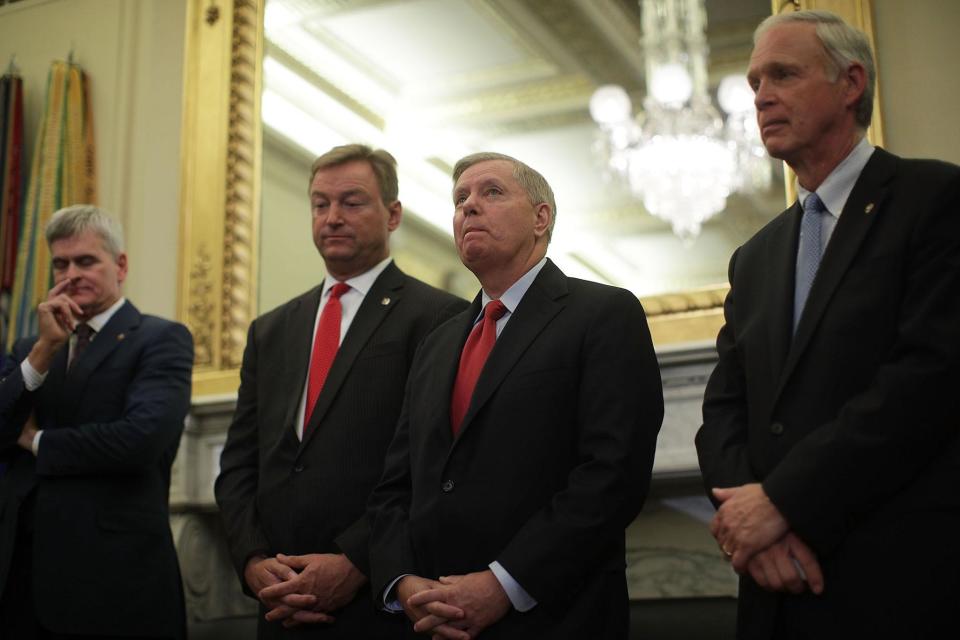Republicans' last ditch effort to repeal Obamacare begins to gain momentum

A new Republican effort to repeal and replace former President Barack Obama’s healthcare law appears to be gaining momentum.
Seven weeks after the party’s last attempt to dismantle Obamacare narrowly failed on the Senate floor, the upper chamber’s Republican leadership is becoming optimistic about the prospects of passing a new healthcare bill by the end of the month.
Last week, Republican senators Lindsey Graham and Bill Cassidy, along with two co-sponsors, introduced their latest plan to repeal Obamacare, marketing the bill as a way of giving US states the flexibility to create the kind of healthcare system they want.
Known as the Graham-Cassidy bill, the measure is expected to push millions off of their health insurance and weaken protections for people with pre-existing conditions, according to the progressive Center on Budget and Policy Priorities.
Republicans have continuously asserted that Obamacare, otherwise known as the Affordable Care Act, has destabilised the individual markets for health insurance and forced consumers to buy insurance they do not want or cannot afford.
Before this week, Congress appeared to have given up on repealing and replacing Obamacare, despite President Donald Trump's repeated declarations that Republican inaction on healthcare reform was “not an option”.
“I told Bill Cassidy he's the grave robber. This thing was 6 feet under,” said the third-highest ranking Senate Republican, John Thune, referring to the Obamacare repeal efforts. “And I think he's revived it to the point that there's a lot of positive buzz and forward momentum.”
A hearing on the Graham-Cassidy bill is scheduled for next week.
If the Senate wants to pass a bill to overhaul Obamacare with just 51 votes, it must do so by 30 September, according to the Senate parliamentarian.
Senate Republicans have been attempting to use a process known as reconciliation to pass a healthcare measure, meaning they only need 51 votes in support of the legislation instead of the normal 60. The party holds a 52-member majority over Democrats in the 100-member Senate.
To conform to the rules of reconciliation legislation, the bill must meet certain requirements, including reducing the budget deficit. Most other bills can be filibustered – when debate over a proposed piece of legislation is extended – and would need 60 votes to end the filibuster, or invoke closure.
If Senate Majority Leader Mitch McConnell does not pass healthcare legislation by the end of the month, he will need at least some Democratic support to pass any type of healthcare reform this year.
But with new optimism surrounding the Graham-Cassidy bill, bipartisanship may not be necessary, and Democrats have revived their efforts to block any Obamacare repeal legislation.
On Monday, Charles Schumer and Nancy Pelosi, respectively the top Democrats in the Senate and House of Representatives, called for the nonpartisan Congressional Budget Office to conduct a full analysis of the Graham-Cassidy bill.
“Republicans are reportedly hoping to rush to a vote with only a scant budget assessment, before the CBO can expose the full consequences of the legislation for working families, without any hearings or committee markups,” they wrote in a letter.
The CBO’s analysis of the practical implications of the bill, including how many people could lose coverage and the effect on insurance premiums, is currently not expected to be available for several weeks.
A group of 10 Democratic and Republican state governors have also urged Mr McConnell to reject the Graham-Cassidy bill and “renew support for bipartisan efforts to make healthcare more available and affordable for all Americans.”
“Only open, bipartisan approaches can achieve true, lasting reforms,” they wrote.
Even if Mr McConnell decides to go against the wishes of the governors, members of his own party could still sink the Graham-Cassidy measure.
“We need to go to regular order,” Republican Senator John McCain, who met with Mr McConnell this week, told reporters. “I am not supportive of the bill yet. We need to talk more about it.”
Mr McCain provided one of the three Republican votes that killed Mr McConnell’s Obamacare repeal efforts in July.
Republican Senator Lisa Murkowski, who also voted against the leadership’s healthcare bill this summer, told reporters she is “still looking” at the Graham-Cassidy proposal.
Meanwhile, Republican Senator Rand Paul in a Fox News editorial already firmly rejected the bill, saying “in no way is it repeal the way we promised.”

 Yahoo News
Yahoo News 